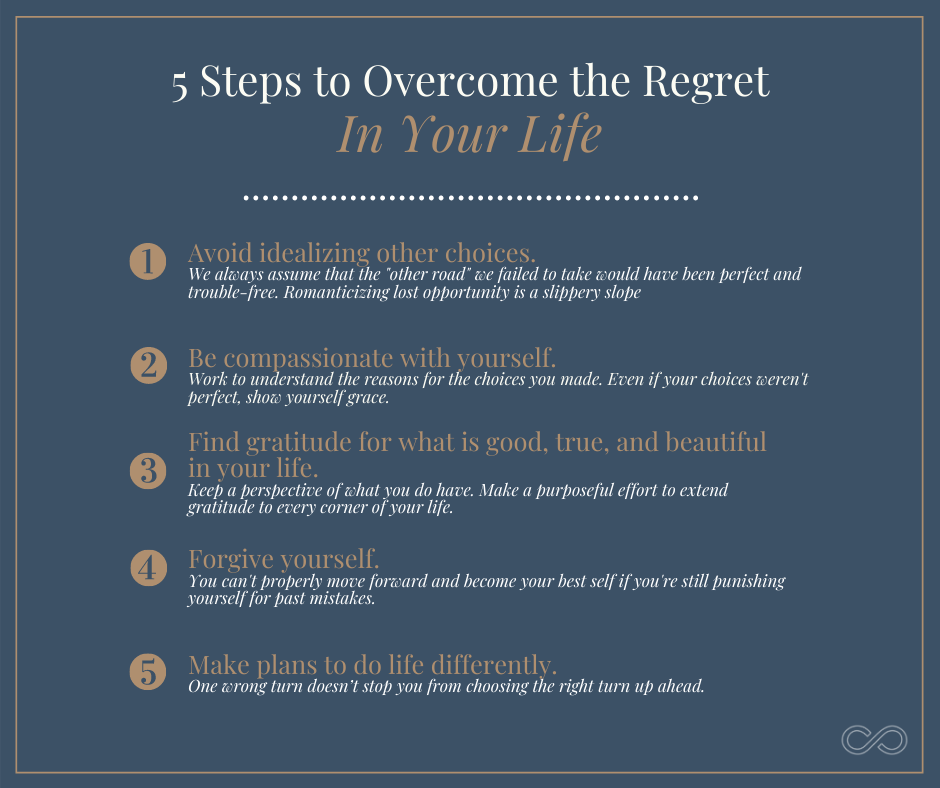I don’t often begin a medical discussion by contemplating philosophies, but we can’t separate the emotional experience of being a human from the practice of medicine.
This is exactly why I’m so excited to welcome back my dear friend, Dr. Brian Hooper, for another insightful discussion about the human mind and the path to wholeness.
As a clinical psychologist and minister, Dr. Hooper works with people of all religions and walks of life. He draws upon spiritual values, psychology, ministry to help his patients overcome challenges and achieve their goals. I couldn’t ask for a better partner than Dr. Hooper to launch into an exploration of regret and the journey to become your most authentic self.
My wonderful nurse practitioner, Jen Justus, and I recently discussed joy as the most underrated human emotion. Joy is also the opposite of regret, with the two on entirely different ends of the same spectrum.
I believe regret is the worst emotion a human being can experience. In more than 12 years as an ER doctor, I’ve witnessed lives riddled with unrest, pain, and suffering, and I’ve watched lives end the same way.
In contrast, my father and grandfather both modeled the most beautiful way to leave this planet with joy, satisfaction, and celebration. I’ve observed the stark differences between a life defined by regret and a life defined by joy.
Regardless of success, we all are bound to stumble over the emotion of regret. But we aren’t powerless to the claws of toxic regret. In fact, I am on a mission to help people strip down and identify the behaviors that create regret, then guide them to achieve joy instead.
What Is Regret?
Shakespeare’s Julius Caesar famously stated, “Cowards die many times before their deaths; the valiant never taste of death but once.”
Translated for the 21st century, Shakespeare captured a powerful truth about regret. If you’re shackled with regret, you may die hundreds of little deaths throughout your life. Yet if you commit to a life of fulfillment and joy, you’ll die just one beautiful death.
So this begs the question: how does regret emerge?
A study performed at Cornell University in 2018 may hold the answer to that urgent question. According to study authors Thomas Gilovich and Shai Davidai, our most enduring regrets stem from the discrepancies between our actual selves, our “ought” selves, and our ideal selves.
The actual self is your real, present self. The “ought” self, on the other hand, includes the duties, obligations, and achievements you believe you should perform. For example, I ought to go to college, or I ought to workout more.
The ideal self is entirely different. As Dr. Hooper explains, the ideal self says, “What is my bliss that helps me be my most authentic self, that helps me feel truly alive, that helps me be the fullest version of myself while I’m in this world?”
Even though it’s one of the most commonly shared human experiences to regret specific mistakes and decisions throughout life, Gilovich’s research found that people are far more haunted by the unfulfilled ideal self.
“What haunts people is when they don’t live up to their ideal selves,” Dr. Hooper describes.
When Does Regret Become Toxic?
As with diabetes or heart disease or Alzheimer’s disease, regret exists on a spectrum. There’s simple, shallow regret – I wish I hadn’t ordered that sandwich for dinner! – that’s nothing more than a small bump in the road and quickly forgotten. Then there’s the regret of serious decisions made: arguments, lost job opportunities, ruined friendships, and financial hardship. These are potholes that can be repaired over time.
The life unlived creates a different, deeper form of regret that often becomes toxic. Regret isn’t just an emotion, it’s an awareness, a recognition of the road not taken. This tumbles into a dangerous cycle of shame, guilt, and disappointment. You may become fixated on that old road you did or didn’t take, rather than the paths still in front of you.
What does all of this really boil down to? At the core of toxic regret is a misalignment with your decision making and the pursuits that would truly bring you joy and fulfillment. Toxic regret takes control when you recognize the misalignment and repeatedly recognize your decisions aren’t congruent with your true self. A dangerous looping process begins and you trap yourself in negative thoughts: I’m worthless, I made all the wrong choices, this ruins everything, my life is over now.
But luckily for us, Dr. Hooper is here to remind us that it’s never too late to overcome toxic regret. “If you’ve not lived up to your ideal self heretofore, that doesn’t mean all time is lost and you cannot go there. I’m a spiritually oriented psychotherapist so my joy is helping people have an ah-ha moment and gather themselves and get back on the journey, and they can do that at any age.”
5 Steps to Overcome the Regret In Your Life
You are on a journey to becoming your most vibrant version of yourself. We all are! But we don’t simply wake up one day and arrive. We’re all in the process of becoming who we want to be.
I love the way Dr. Hooper describes this: “We spend very little time stepping over thresholds. We spend the vast majority of our time going from one threshold to another.”
When leveraged properly, regret simply shows you what hasn’t worked in the past. Regret doesn’t mean you’re stuck with those disappointments forever.
Maya Angelou said it best: “Do the best you can until you know better. Then when you know better, do better.”
1. Avoid Idealizing Other Choices
The grass is always greener on the other side. It’s easy to dismiss this cliche, but it holds a universal truth. We always assume that the “other road” we failed to take would have been perfect and trouble-free. Romanticizing lost opportunity is a slippery slope; it’s much healthier to focus on the green grass under your feet.
2. Be Compassionate With Yourself
We all have compassion for others; for elderly adults who need assistance at the grocery store, for young children who crave affection, for our friends suffering unthinkable tragedies. But do we show ourselves the same authentic compassion?
Work to understand the reasons for the choices you made. Even if your choices weren’t perfect, show yourself grace.
3. Find Gratitude for What Is Good, True, and Beautiful in Your Life
Poor decisions or lost opportunities do not invalidate other aspects of your good character or the strong parts of your life. Keep a perspective of what you do have. Make a purposeful effort to extend gratitude to every corner of your life.
4. Forgive Yourself
“I believe in a God who forgives,” says Dr. Hooper. “So unless I’m smarter than that God, who am I to say I don’t deserve to be forgiven?”
Regardless of your spiritual or religious beliefs, forgiving yourself is absolutely vital to breaking the cycle of toxic regret. You can’t properly move forward and become your best self if you’re still punishing yourself for past mistakes.
5. Make Plans to Do Life Differently
One wrong turn doesn’t stop you from choosing the right turn up ahead. Think of a ten-hour road trip. You’re bound to miss a cue from your GPS once or twice, but you still make it back to the main road and reach your destination. So why should life be any different?
So don’t let your past wrong turns define your future direction. Even your language plays a role in this! Instead of saying, “I always do this…”, say, “Up until now I….”, or, “I have in the past done this… but now I’m learning to…”
It’s amazing how the simple subtleties of language can transform your mindset and empower you to embrace your fullest, most rewarding life.
How to Prevent Regret in the Future
If you really want to liberate yourself from the shackles of regret, you need to be like any good sports team: offensive and defensive.
On the defensive end, audit what you’re feeling. Notice your thoughts. Evaluate your emotions. When you feel a certain emotion, what is the thought process behind it, and is that thought true?
Then go on the offense. Take action or confirm, correct, or disprove your thinking. Imagine, if a certain thought wasn’t true, how your life could be different.
This defensive and offensive strategy embodies one of Dr. Hooper’s favorite mantras: “When I believe it, I behave toward it, and then I become it.” If you don’t take a defensive stance against your negative, toxic thoughts of regret you’ll always behave toward your regret and ultimately become it.
Of course, cleansing and clarifying your belief system doesn’t happen in an hour or a day. It’s not a simple process! In order for you to move in a different direction based on new beliefs, you have to undo old beliefs. And the problem with beliefs is that you believe they are true!
This is why the auditing process is so important. If you change your beliefs, you change your thinking… and you change your life.
Live Intentionally
Dr. Hooper so wisely reminds us that we need to be intentional about the life we want to live. It doesn’t happen by accident! The process is simpler than you might think:
Step #1: Imagine your goals day by day.
Step #2: Set concrete mini-goals to achieve them.
For example, if you want to begin each morning with meditation at 6:00 AM, and you value meditation for the depth it adds to your day, then set your alarm for 5:45 AM.
These small, intentional behavioral changes, performed over and over again, create incredible breakthroughs. Just like a marriage, your relationship with yourself is forged by an infinite number of tiny actions and communications.
Even very successful people experience struggles and regret. After all, we’re only human. These strategies can help point us in the right direction to tackle lingering issues and festering wounds.
Dr. Hooper’s final words encompass this message beautifully. “As you are struggling with regret, use it as an opportunity for your mind and heart to open to a whole new vista that’s really about connectedness to God, yourself, and the rest of creation.”

Dr. Aaron Wenzel is a concierge physician specializing in the care of fast-moving entrepreneurs, executives, and public figures in the Nashville, TN area. Dr. Wenzel’s diverse life experience and extensive training in family medicine, emergency care, nutrition, and hormone replacement therapies give him the unique platform to provide unmatched care for his patients.







